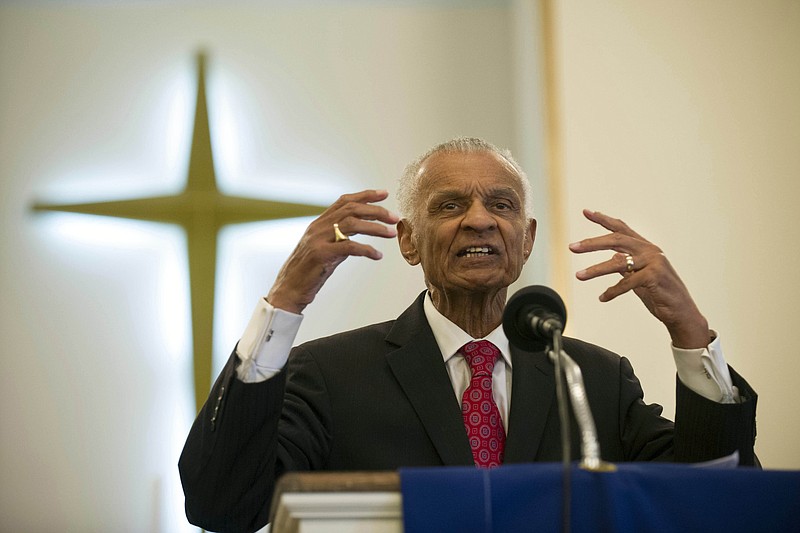C.T. Vivian, the civil rights leader who died at age 95 on July 17, pastored a Chattanooga church during the turbulent and frenetic early 1960s when the civil rights movement was gaining strength. But his biography on the C.T. Vivian Leadership Institute website and other online backgrounders do not mention Chattanooga, and the one mention of the city in The New York Times obituary of Vivian was incorrect.
His time in Chattanooga was relatively short, to be sure, but not only did his bloody experience as a "Freedom Rider" occur during his tenure at the Cosmopolitan Community Church here, but he also became involved in local politics, in local voter registration drives, and in local protests over the lack of Black jobs at a local grocery story, over the closing of several city schools and over the lack of integration at Erlanger hospital.
A Missouri native, Cordy Tindell Vivian was working in his first professional job for Carver Community Center in Peoria, Illinois, when the sit-in demonstrations in which he was involved helped integrate that city's Barton Cafeteria in 1947. But it was during his time in Nashville, where he studied at American Baptist College and later became pastor of First Community Church, that he really cut his civil rights teeth.
There, on April 19, 1960, he and 4,000 demonstrators marched on City Hall, where they confronted Mayor Ben West, who acknowledged that racial discrimination was morally wrong and began to desegregate the Tennessee capital's public facilities.
Shortly after that, according to Encyclopedia.com, Vivian took the post in Chattanooga, where he would stay until late 1963, when Dr. Martin Luther King Jr. asked him to join his staff as director of affiliates for the Southern Christian Leadership Conference (SCLC) in Atlanta.
In early May 1961, the church hosted Black speakers from Fayette County, Tennessee, who described how they were driven from their tenant farms, couldn't buy supplies and were unable to get medical attention because they had registered to vote.
"We are tired of tea parties with a certain select few," Vivian said, excoriating the era's method of race detente, according to newspaper archives. "We find freedom at the negotiation table, not at the tea table."
Later in the month, perhaps emboldened by the West Tennessee speakers, he participated in one of the first Freedom Rides - this one into a Jackson, Mississippi, bus terminal, where he and others were charged with breach of peace for entering the terminal's whites-only facilities.
Choosing not to pay the assessed $200 fine, Vivian was sent to a prison farm, where he was beaten by a prison guard for failing to address him as "sir." It would be one of several times during the next five years he would be hurt in attempts to achieve civil rights.
Days later, during a Chattanooga program, he said the riders chose Jackson because "we wanted to show the raw hate of the South. ... We realized we had to keep up the tension, and we were willing to suffer to keep the tension up."
Vivian also attempted to exhort the young people in attendance:
"Nobody gives you anything," he said, according to newspaper archives. "If we do not have inside what it takes to fight for freedom, we don't deserve freedom. Get ready for freedom, because it's coming. You young people: Don't take the old courses and let them teach you how to be a maid. Now is the time to get ready for better things."
During 1962, he was on the local committee for the meeting of King's SCLC for a two-day conference in Chattanooga, and helped host King's father, the Rev. Martin Luther King, for a voter registration drive.
The goal is a "change in all political levels from Memphis to Bristol," to register and "show the power of the Negro vote throughout Tennessee," Vivian said. He pictured the Black vote one day which "controls the city of Chattanooga. ... Politics is one of the grand roads for progress. We fight for every citizen of Tennessee."
In 1963, he was involved in that local vote, appealing to the Metropolitan Government Charter Commission with a seven-point program that included districts to ensure minority representation, and heading a Tennessee Voters Council that selected candidates in city elections that would be most responsive to Black needs.
Metro government never happened in Chattanooga, and it would be the late 1970s before Hamilton County and the late 1980s before Chattanooga drew up representative districts.
Months after Vivian was the state coordinator for trips to attend King's August 1963 march on Washington, King plucked him from Chattanooga for his leadership team.
Whether or not the civil rights leader was a modern Paul Revere, as one 1961 local news story described him, there's no doubt he was a herald and a leader in a movement that launched the country toward a more just society.
